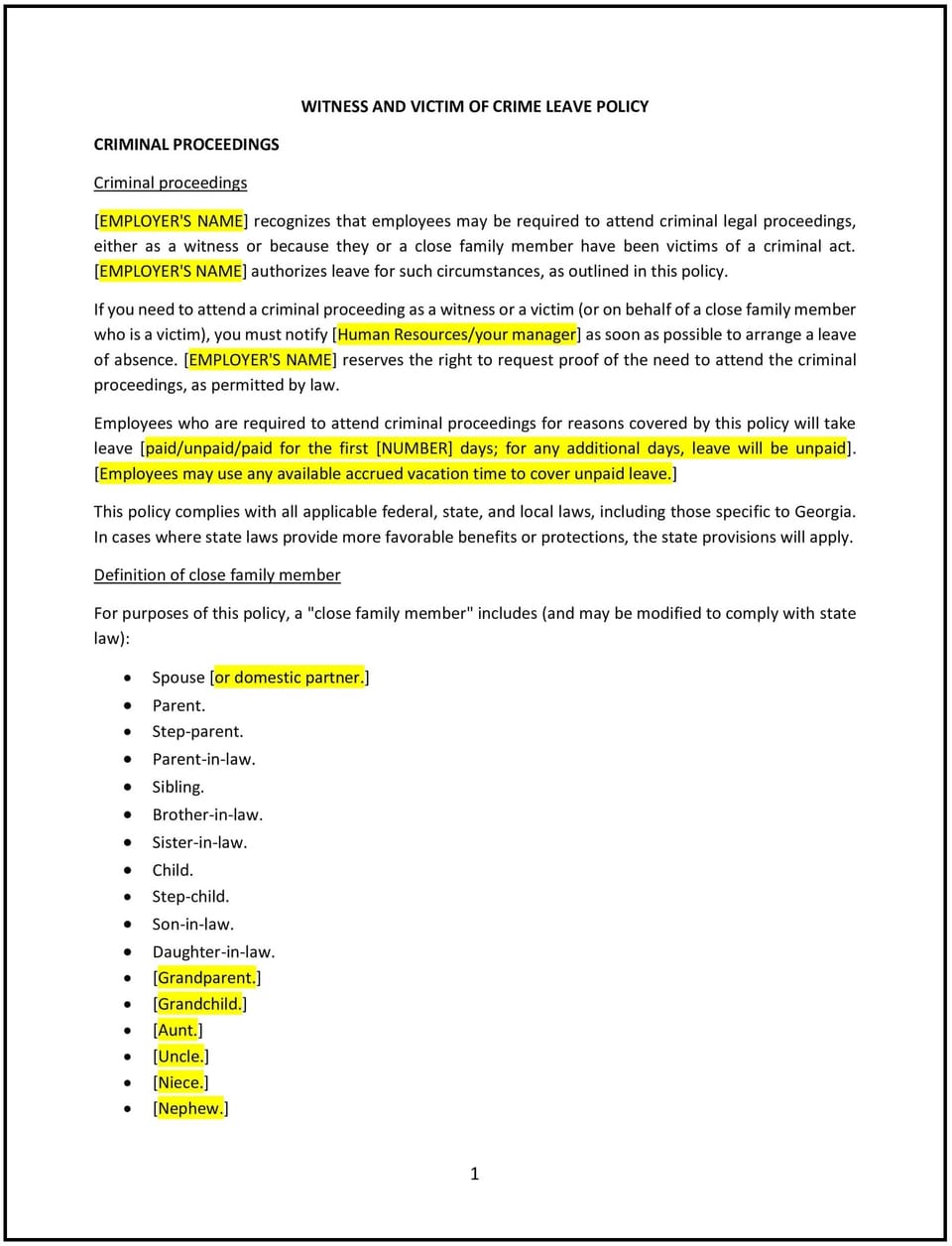Witness and victim of crime leave policy (Georgia): Free template

Witness and victim of crime leave policy (Georgia)
This witness and victim of crime leave policy is designed to help Georgia businesses support employees who need time off to fulfill legal obligations as a witness or victim of a crime. The policy outlines eligibility, notification requirements, and procedures for managing absences while maintaining workplace continuity.
By implementing this policy, businesses can demonstrate compassion, support civic responsibilities, and foster a positive work environment.
How to use this witness and victim of crime leave policy (Georgia)
- Define eligibility: Specify which employees are eligible for leave under this policy, such as those subpoenaed as witnesses or required to attend court as victims.
- Establish notification procedures: Require employees to provide advance notice of their need for leave, including official documentation like a subpoena or court notice.
- Address duration of leave: Clearly outline the expected duration of leave and any provisions for extended absences.
- Specify pay guidelines: Indicate whether the leave is paid, unpaid, or partially paid, depending on business practices and legal requirements.
- Maintain communication: Encourage employees to stay in touch about their availability and any updates related to their court obligations.
- Protect job security: Reinforce that employees will not face retaliation or adverse consequences for taking leave under this policy.
- Review regularly: Periodically assess the policy to reflect changes in Georgia laws or workplace practices.
Benefits of using this witness and victim of crime leave policy (Georgia)
Implementing this policy provides several advantages for Georgia businesses:
- Supports civic duties: Encourages employees to fulfill legal responsibilities without added stress.
- Enhances morale: Demonstrates care and support for employees during challenging circumstances.
- Promotes fairness: Ensures equal treatment for employees needing time off for court obligations.
- Minimizes disruptions: Clear guidelines help businesses manage workloads and maintain operations during employee absences.
- Reflects Georgia-specific practices: Tailoring the policy to local legal and workplace standards ensures relevance.
Tips for using this witness and victim of crime leave policy (Georgia)
- Communicate policy details: Share the policy with employees during onboarding and make it easily accessible.
- Provide guidance: Offer support to employees navigating legal obligations, such as information about available resources.
- Plan for coverage: Ensure proper planning to manage workloads during employee absences.
- Foster a supportive environment: Encourage open communication to help employees feel comfortable discussing their needs.
- Monitor effectiveness: Periodically evaluate the policy’s impact and make adjustments based on feedback and evolving practices.
Q: What types of court obligations are covered under this policy?
A: The policy covers obligations such as appearing in court as a witness, attending hearings as a victim, or complying with subpoenas.
Q: How should employees notify their employer about the need for leave?
A: Employees should provide advance notice along with supporting documentation, such as a subpoena or court notice.
Q: Is leave under this policy paid or unpaid?
A: Businesses should specify whether the leave is paid, unpaid, or partially paid, based on their internal practices.
Q: Can businesses require proof of court obligations?
A: Yes, businesses should request official documentation, such as a subpoena, to verify the need for leave.
Q: How should businesses handle extended absences due to court obligations?
A: Businesses should maintain communication with the employee and develop contingency plans to manage workloads during extended absences.
Q: Are employees protected from retaliation for taking leave under this policy?
A: Yes, businesses should emphasize that employees will not face adverse actions for fulfilling their legal obligations.
Q: How often should this policy be reviewed?
A: The policy should be reviewed annually or as needed to reflect changes in Georgia laws or workplace practices.
This article contains general legal information and does not contain legal advice. Cobrief is not a law firm or a substitute for an attorney or law firm. The law is complex and changes often. For legal advice, please ask a lawyer.


